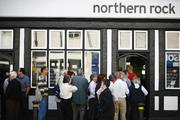 The credit crunch is global. So why has there only been a run on the banks in Britain? Alistair Darling suggests Northern Rock is a mere domino in a chain which started in America. But John Redwood’s blog points out that the first domino was knocked over by the clumsy fingers of the Labour government. Only in Britain did the central bank refuse to boost liquidity by lending at a non-penalty rate (unlike the ECB, the Fed, the Norwegians, Swiss, Russians etc).
The credit crunch is global. So why has there only been a run on the banks in Britain? Alistair Darling suggests Northern Rock is a mere domino in a chain which started in America. But John Redwood’s blog points out that the first domino was knocked over by the clumsy fingers of the Labour government. Only in Britain did the central bank refuse to boost liquidity by lending at a non-penalty rate (unlike the ECB, the Fed, the Norwegians, Swiss, Russians etc).
The next bit sounds nerdy, so was the ERM crisis so stay with me. Exacerbated by the BoE’s intransigence, the de facto cost of bank borrowing, three-month LIBOR, has risen from 6% to 6.85%. These costs will be passed on to customers. People are about to feel the pain of a problem which could have been assuaged by better judgement at the Bank of England and more vision from our ministers who failed to realise what would happen.
I spoke to Ross Walker, an economist at RBS, who had this to say: “I do think we will see mortgage rates rise further. As a rough rule of thumb it will be at least by a quarter point.” But he says the credit crunch “will come in other forms as well, there will be new restrictions. Banks will decide not to grant loans, where once they could have. A lot of the time, people’s mortgage rates are advertised as being fixed to the bank rate. But if you read the small print, is this the Bank of England base rate or is it a commercial bank rate?” I hate to admit that with my mortgage I have no idea.
There has been much patronising criticism of the folk queuing outside Northern Rock today, as if they don’t know what they’re doing. A rather well-heeled friend of mine in the City took his cash away from Northern Rock last month, fearing precisely this. The City saw a while ago what our ministers are only realising now. It’s worth keeping an eye on Redwood’s blog in the next few days. The debt chicken may be finally coming home to roost.
The Spectator
How government and the Bank of England exacerbated the credit crunch






Comments